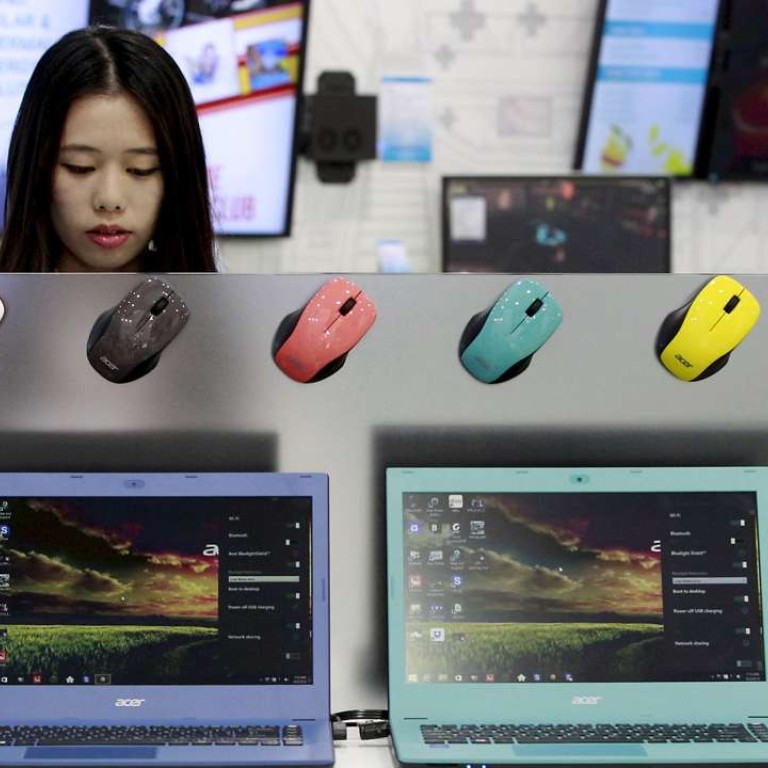
Head of PC maker Acer’s cloud unit calls 2017 ‘important time for takeoff’
Maverick Shih’s cloud services blueprint is to form partnerships with outside companies
Four years ago, Taiwan PC vendor Acer began to do what everyone else was doing and build a cloud services businesses complementary to its hardware.
The trouble was, it was late, and the company admits it still hasn’t made much money out of the move.
But that will start changing this year, insists Maverick Shih, Acer’s cloud unit president and the 43-year old son of the company’s founder, Stan Shih.
“Revenue is still not too much,” Shih Jnr said in an interview with South China Morning Post, before confidently predicting 2017 will be an “important time for takeoff”.
Shih certainly comes with the technical and business background to effect that.
Acer now competes in Asia with the likes of Amazon.com, Microsoft, Alibaba, Salesforce.com and SAP – companies that market research firm IDC ranks as the region’s favourite cloud service providers in that order.
Acer and other tech hardware providers are working fast to build cloud units because many of their
customers might already own PCs or tablets, but with little internal storage.
Vendors of the equipment often install some data storage for in-house purposes and might now want throw in cloud services as pre-installed software.
“It is difficult to make money out of these services as there are many other free offerings that provide cloud storage for consumers,” said Kenneth Liew, lead PC analyst with IDC Asia Pacific.

Today’s cloud services, often for business use, normally cover data storage as well as use software and operating systems online instead of a local computer system.
Shih received a PhD in 2003 from the University of Southern California, where the student who describes himself as good at maths since childhood invented digital music technology, that let listeners find songs by humming a melody.
He later launched his own company, MAVs Lab, consistent with the English-language name he gave himself as a symbol of being what he calls “different.”
But despite funding from his parents, the start-up failed after two years of designing integrated circuits and analysing videos for intellectual property purposes.
Shih has described MAVs Lab as being too early for mass-market demand.
“You can always be early,” he said, speaking English that he honed in California. “But do you have enough cash to live longer?”
He later joined EgisTec in Taiwan as vice chairman, focusing on fingerprint-sensor and security software. He spent much of his energy meeting customers, including Acer and major PC competitors such as Taipei-based ASUSTeK Computer, and with the engineers of EgisTec’s contract manufacturers.
Shih’s technical knowhow, overseas education, his experience of running a collapsed start-up, and strong contacts in the industry made him a strong choice as president of Acer’s cloud unit, now called BYOC Smart Products. Maverick was hired in 2013 to run the unit.
Two years earlier, Acer bought American cloud-service provider iGware, with father and son hoping the acquisition would give Acer an edge in cloud computing.

But so far cloud services offered by Acer’s cross-town rival ASUSTek Computer have gained traction in Taiwan and a few parts of China, said Tracy Tsai, research vice president with the Taipei office of Gartner, another market research firm. While Acer has had to weather a tough leadership transition.
Italian-born CEO Gianfranco Lanci resigned that year over differences with the board of directors and Stan Shih – now 72 who started Acer in 1976 – was forced out of retirement in 2013 to serve as chairman and president after a record financial loss following a slump in global laptop demand.
The company posted a profit in the first three quarters of 2016.
Maverick Shih’s cloud services blueprint is he and his staff of about 300, based largely at the company’s suburban Taipei headquarters, look to form partnerships with outside companies.
Acer offers the hardware, the strength that makes it the world’s sixth largest PC developer by market share, and the partners put up the service software, he said.
One example is its joint venture with a start-up in California to develop the grandPad, a tablet plus a monthly subscription fee, for people over age 75 to stay connected with family members.
“That’s what we’re good at doing, the hardware part,” Shih said.
Revenue is still not too much [but 2017 will be an] important time for takeoff
“But you need to have the human-centered software. We know that’s our weakest point. Having the passion to serve, the senior, in this case — that’s what missing in our DNA.”
BYOC Smart Products and Taiwan carrier Chunghwa Telecom also work together on a cloud service called Mobile Extension, that routes calls from fixed-line phones to an app.
Products developed under Shih’s department are set up so they can be spun off into separate units with the potential for IPOs, he said.
His department, he adds, is best-described as a “holding company” that provides “a very good environment” for the smaller units.
Ideally Acer’s services will target users of multiple devices, Shih added.
“How do you use cloud easily across devices without a cable?” he asked. “That’s the reason (we) need cloud tech, to make that happen.”
His company’s “takeoff” into the cloud hinges on work ethic, as well, with his staff all willing to work hard in the same direction.
“Everyone has to work hard. That’s a default,” he said. “But it’s not sufficient. They all have to work hard in the right way.”

